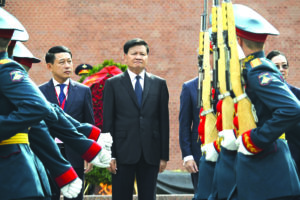
LGBTQ+ cafe sign draws
backlash in Berlin
BERLIN, July 31: A neon sign in Berlin’s trendy Das Hoven cafe, “QUEER AND FRIENDS,” has become a beacon for hate and homophobic attacks against LGBTQ+ people. Owner Danjel Zarte has reported 45 pending criminal investigations related to the cafe, ranging from verbal and physical attacks to windows being broken or covered in faeces and Nazi graffiti.
The rise of hate crimes against LGBTQ+ people and gay-friendly establishments is a growing issue across Germany, including Berlin, a city that has historically embraced the LGBTQ+ community. Last year saw a 40% increase in violence targeting LGBTQ+ people in 12 of Germany’s 16 federal states compared to 2023, according to the Association of Counselling Centres for Victims of Right-Wing, Racist and Antisemitic Violence. Activists argue that these figures only show a fraction of the problem’s scope because victims are often afraid to come forward.
They partly blame the rise of the far-right across Europe, including in Germany, where the Alternative for Germany party made significant gains in the February election. The fear was palpable at Saturday’s Christopher Street Day parade in Berlin, commemorating the 1969 Stonewall rebellion in New York City. (AP)
Researchers in China propose
anti-Starlink measures
ROME, July 31: Chinese researchers are devising countermeasures—including lasers, sabotage, and attack satellites—to challenge Elon Musk’s Starlink network, which they view as a growing security threat. Since Russia’s 2022 invasion of Ukraine, where Starlink aided Ukrainian forces, Chinese military and academic institutions have published over 60 papers outlining strategies to disrupt or destroy the satellite system.
Proposed tactics include using space-based lasers, tailing satellites with drones, and exploiting vulnerabilities in Starlink’s supply chain. Although Starlink doesn’t operate in China, its satellites pass over the region, prompting simulations showing full coverage of key areas like Beijing and Taiwan. China is also developing its own mega-constellations to compete globally. The U.S. and its allies increasingly rely on Starlink, amplifying Beijing’s concerns about foreign control of critical communications infrastructure and space dominance. (AP)



